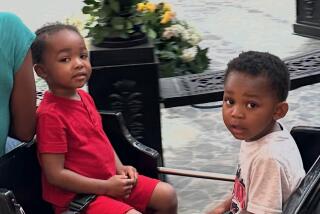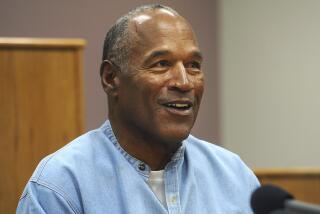The Next Question: What About His Kids? : Families: The trial is over and they have their dad back, but the upheaval in the lives of Sydney and Justin Simpson is still going strong, experts say.
Until two days ago, they had not seen their father since their mother’s funeral, hardly the happiest moment for anyone in the Simpson-Brown families.
And now with the possibility that 9-year-old Sydney Simpson and her brother, Justin, 6, may return with O.J. Simpson to the big house in Brentwood where they lived before their parents separated, experts say it may not be the most auspicious of family reunions.
“I don’t think there is a child psychologist in America who isn’t quaking for the developmental futures of those two kids,” said Peter Gellis, a psychologist and sociologist who runs the Family Violence Research Program at the University of Rhode Island.
A readjustment with their father is almost bound to be rocky, specialists say. But openness, giving the children age-appropriate responses to questions they will inevitably have, can help smooth the transition. A gradual reunification also may help ease the children’s move back to a home that was the scene both of happier and unhappier times for them. Specialists also say an objective outsider--ideally, a therapist or someone else who is trained in child adjustment--should be close at hand in the critical early weeks and months of the restructured Simpson family.
The complications of reuniting the Simpson family are especially thorny because, as Gellis observed, “Yogi Berra was wrong. Even when it’s over, it’s not over.”
Although O.J. Simpson was acquitted of all charges in the murders of Nicole Brown Simpson and Ronald Goldman, much of America remains convinced of his guilt. Both the Brown and Goldman families have filed civil lawsuits against Simpson, which may require extensive court appearances. Simpson will presumably speak publicly, perhaps often, about the case at some point and may write a book.
So while the verdict was final, the case is by no means neatly sewn up.
With the family disrupted first by divorce, then by the death of the children’s “key psychological caretaker,” Sydney and Justin will lack a psychological anchor in their father’s Westside mansion, Gellis said.
Children “absolutely, positively have to have a key person who is there for them unconditionally,” he explained, and for a variety of reasons, “men rarely take the role of psychological caretaker.”
Days after the death of their mother, Gellis went on, “the fallback position of Dad” was eliminated for the Simpson children with the wild and weird freeway odyssey of their father and his friend Al Cowlings in the legendary white Bronco.
Further, said Gellis and others who study children and the family, the Simpson children have experienced major disruption by abruptly moving in with the parents and sisters of Nicole Brown Simpson in Orange County. Their 16-month sojourn at their grandparents’ home may have been a noble attempt at stability, and for adults, such a hiatus might be easily assimilated. But for children as young as Sydney and Justin, a year and four months represents a huge chunk of their lives, during which their father’s absence has to have been a troubling issue.
As Gellis noted, “They haven’t been living in a Skinner box, and they haven’t been living in a bubble.” No matter how hard adults may have tried to shield them from the circumstances of their mother’s death, as well as their father’s incarceration and trial, those facts almost undoubtedly gnawed at the children.
“I’m sure there will be a honeymoon with Dad,” Gellis said. But a possible move back to Rockingham “is now another major move, another disruption. And Dad has yet to demonstrate a stable lifestyle.”
From the very moment that Simpson’s not guilty verdict was announced on Tuesday, “The first thing that came to my mind was, ‘What about the children?’ ” said Lenora Poe, a psychologist in Berkeley who works with families who have experienced separation through incarceration. Poe also treats families where grandparents are raising their grandchildren.
Based on her experience, Poe said, “I am very, very concerned for these children.”
Like others in her field, Poe urged that together, the Simpson children and their father “get some kind of psychological help.” In working with children who are reunited with parents after incarceration, Poe said she uses a number of therapeutic aids, particularly art therapy, to help young people sort through their confusion.
Ambivalence, anger and anxiety are common emotions in such situations, Poe said. And while these responses can’t be eliminated, they can be allayed by moving carefully--and preferably, slowly.
“If you push,” wrenching Sydney and Justin too quickly from Juditha and Louis Brown, their grandparents, “you’re going to run up against more issues of abandonment,” Poe cautioned.
*
Constant reassurance is an important piece of the readjustment equation, said Purdue University psychologist Douglas Sprenkle. Sydney and Justin will almost certainly have questions, for example, about their father’s trial. Sprenkle advised direct, simple answers, along the lines of: “There was a lengthy trial, and there was a swift, unanimous decision to acquit your father.”
Tell the children that not everyone in America agrees with that outcome, Sprenkle continued. But emphasize also that no matter what happens, he can’t be re-tried on these charges.
Sprenkle said he was less worried about how Sydney and Justin might deal with possible taunting from other children if they move back to their old neighborhood. That kind of cruelty--at which young children excel--may happen even if the Simpson children had remained with their grandparents.
But Florida State University psychologist Charles Figley, whose recent research has focused on children in celebrity families, said the children will nonetheless require shielding and protection by “O.J. and everyone else in their families.” The two children are so well-known and easily recognized that “all kinds of people are going to be saying things to them at shopping centers and at school,” Figley said.
Their immediate and extended families can provide a powerful cushion. “The presence of two sets of grandparents and family members who are very devoted to these children and who perceive them as victims works strongly in favor of Sydney and Justin,” Figley said.
Since continuity is vital, “I’d give the grandparents almost carte blanche access” to Sydney and Justin, Figley suggested. Echoing recommendations for a gradual transition, Figley also advocated sending the children back to Rockingham with favorite toys, bed linens, knickknacks and especially Kato, the dog, that have surrounded them at their grandparents’ home.
As much as possible, Figley said, “I’d try to make it appear as totally normal as they can, as if, ‘Of course! This always happens in families.’ ”
But the very fact that the children may resettle in a home that was the scene of some violent confrontations between their parents gives pause to specialists. Nicole Brown Simpson placed at least eight emergency assistance calls to police, and O.J. Simpson pleaded no contest to battering his wife. No one knows what the children may have seen or heard in these instances.
*
At the Family Violence Prevention Fund in San Francisco, Associate Director Janet Carter was so upset by the prospect of Sydney and Justin returning to their old home that she could barely discuss it.
“This is just so horrible,” Carter said, because research into the behavior of batterers shows that such abuse is “definitely progressive.” Without therapeutic intervention, “My concern is that the violence will continue from one relationship to the next, and these kids will witness it,” Carter said. Witnessing an act of battering is often a predictor “that you will grow up to be a batterer yourself,” she added grimly.
In his research into family violence at the University of Rhode Island, Gellis said the developmental impacts are worse for children who are present for an act of domestic abuse than if the children themselves are hit.
“You want to harm a child?” he asked. “Let them witness domestic violence.”
As a consequence, Gellis said, “I don’t think there is a child in America who would volunteer to live in that home where those 911 tapes were made.”
Gellis said a further danger is the connection between wife abuse and child abuse. His own research shows that “men who batter their wives have a 60% chance of abusing their children.”
In the case of O.J. Simpson, he said, “Here’s a man who paid no price for these previous actions.”
That fact alone, Gellis said, “bodes ill for his capacity to manage his anger toward anybody.”
More to Read
Sign up for Essential California
The most important California stories and recommendations in your inbox every morning.
You may occasionally receive promotional content from the Los Angeles Times.










